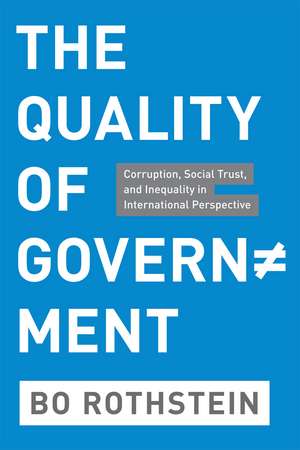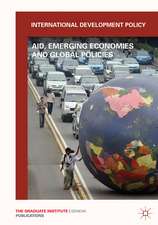The Quality of Government: Corruption, Social Trust, and Inequality in International Perspective
Autor Bo Rothsteinen Limba Engleză Paperback – sep 2011
The relationship between government, virtue, and wealth has held a special fascination since Aristotle, and the importance of each frames policy debates today in both developed and developing countries. While it’s clear that low-quality government institutions have tremendous negative effects on the health and wealth of societies, the criteria for good governance remain far from clear.
In this pathbreaking book, leading political scientist Bo Rothstein provides a theoretical foundation for empirical analysis on the connection between the quality of government and important economic, political, and social outcomes. Focusing on the effects of government policies, he argues that unpredictable actions constitute a severe impediment to economic growth and development—and that a basic characteristic of quality government is impartiality in the exercise of power. This is borne out by cross-sectional analyses, experimental studies, and in-depth historical investigations. Timely and topical, The Quality of Government tackles such issues as political legitimacy, social capital, and corruption.
Preț: 289.96 lei
Nou
Puncte Express: 435
Preț estimativ în valută:
55.49€ • 57.78$ • 46.90£
55.49€ • 57.78$ • 46.90£
Carte tipărită la comandă
Livrare economică 07-21 martie
Preluare comenzi: 021 569.72.76
Specificații
ISBN-13: 9780226729572
ISBN-10: 0226729575
Pagini: 304
Ilustrații: 14 halftones, 2 line drawings, 14 tables
Dimensiuni: 152 x 229 x 18 mm
Greutate: 0.4 kg
Editura: University of Chicago Press
Colecția University of Chicago Press
ISBN-10: 0226729575
Pagini: 304
Ilustrații: 14 halftones, 2 line drawings, 14 tables
Dimensiuni: 152 x 229 x 18 mm
Greutate: 0.4 kg
Editura: University of Chicago Press
Colecția University of Chicago Press
Notă biografică
Bo Rothstein is the August Röhss Chair in Political Science at the University of Gothenburg in Sweden. He is the author of several books, including, most recently, Social Traps and the Problem of Trust.
Cuprins
Preface and Acknowledgments
1 What Is Quality of Government?
2 Quality of Government: What You Get
3 Corruption: The Killing Fields
4 Creating Political Legitimacy: Representative Democracy versus Quality of Government
5 Curbing Corruption: The Indirect "Big Bang" Approach
6 Quality of Government and the Welfare State
7 The Low Trust–Corruption–Inequality Trap
8 Quality of Government and Social Trust: Two Experiments
9 The Tale of Two Countries: Democratic Jamaica versus High Quality of Government Singapore
10 Preventing Societies from Self-Destructing
References
Index
1 What Is Quality of Government?
2 Quality of Government: What You Get
3 Corruption: The Killing Fields
4 Creating Political Legitimacy: Representative Democracy versus Quality of Government
5 Curbing Corruption: The Indirect "Big Bang" Approach
6 Quality of Government and the Welfare State
7 The Low Trust–Corruption–Inequality Trap
8 Quality of Government and Social Trust: Two Experiments
9 The Tale of Two Countries: Democratic Jamaica versus High Quality of Government Singapore
10 Preventing Societies from Self-Destructing
References
Index
Recenzii
“Rothstein makes a convincing case that government corruption reduces social trust, which in turn leads to less productive social-political economies and more inequality. Recognizing the full causal chain is essential to achieving success in efforts to improve the welfare of the poor living in corrupt countries. Rothstein’s book should be read by all concerned with development inequities.”
“Bo Rothstein asks what high-quality government can and should be, and gives us multiple reasons to care about the answers he proposes. The Quality of Government is a theoretically sophisticated and imaginative discussion of issues that have needed a fresh look for some time.”
“This is social science at its best. Ranging widely over the literatures in political science, sociology, economics, and many other fields, Bo Rothstein sheds light on why some governments work better and instill more trust than others—and provides much practical policy advice on the side.”
“Bo Rothstein cogently and profoundly analyzes governments through dysfunctional institutions, providing readers with a look into the complex and disturbing world of failed states, corruption, clientelism, patronage, civil war, and discrimination. This work applies serious depth to the crucial issues of governance and proper state functioning.”
"In The Quality of Government, Bo Rothstein offers a rich and detailed discussion of the relationship between the quality of governing institutions and the outcomes citizens enjoy. . . . This work offers much more than a trite tautology. By showing why and how such factors matter, and showing that they can be more important than factors such as a country's level of democracy or efficiency, the book breaks useful ground. . . . If you are sold on the idea of 'quality of government,' this book will cement that. If you are not, this book will probably convince you."
"What is 'quality of government'? How much does it matter, and why? And—a crucial practical issue for a world in need and upheaval—how can it be improved? To address these questions, Bo Rothstein deploys philosophy, statistics, psychological experiments, and history. He reviews what political scientists have written, adds a touch of public administration, and occasionally refers to the work of economists. Citing John Stuart Mill, John Rawls, and Brian Barry's Justice as Impartiality, Rothstein boils down good government to impartiality, which is different from, and conceptually preferable to, democracy, the rule of law, and efficiency."
“Bo Rothstein does a good job of conceptualizing the quality of government. Overall, the book will be of interest to those who want to see a good work of conceptualization and discussion of fairness, justice, welfare, and social trust, and their antipodes, such as corruption.”
“Rothstein presents a number of theoretical frameworks, statistical data, empirical cases, and scenario experiments to explore the relationship between QoG and many important economic and social outcomes in a readable and convincing way. . . . The book does an excellent job of analyzing why and how QoG matters, and its findings are both important and enlightening. . . . An important piece of scholarship that is worth reading not only for academic researchers in the fields of political legitimacy, social capital, and corruption but also for policymakers who would like to translate discourse into practice.”

















